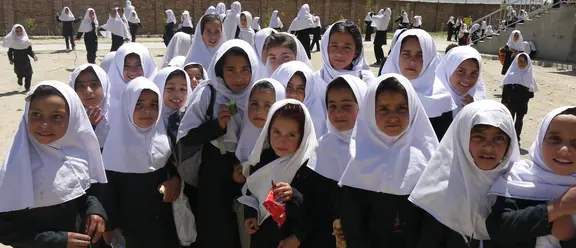Afghanistan: Interview about working for children and women
In order to carry out projects promoting the rights of children and women, the Terre des Hommes partner organizations rely on the support of religious leaders and local authorities. Dealing with them requires great sensitivity – and not just since the Taliban takeover. The staff of the Afghan Women Educational Centre (AWEC) have extensive experience in this area and can therefore continue their work – albeit unofficially and in the background. In this interview, one of them talks about the challenges of working for women and children after the Taliban takeover.
How about the girls and women in Afghanistan with the Taliban government?
Your rights are severely restricted. Girls are usually not allowed to attend higher schools or universities, women are excluded from most jobs. However, a few still work, for example in hospitals.
The so -called Mahram is a big problem: women are only allowed to accompany male relatives or husbands. As a result, they often do not come to the doctor in time, not to mention their participation in public life, opportunities for education or income. The Taliban have abolished the "Ministry of Women's Affairs" and reinstated the "Ministry for the spread of virtue and the prevention of loads". Many women report that they were threatened against the restriction of women's rights because of their protests.
Working at AWEC still the same people as a year ago or did some have to leave the country?
Some left the country. They support and advise the newly hired colleagues from the outside.
What role do religious leaders and Schuras, i.e. the Islam councils, play for the successful implementation of the project?
Their role is very important, especially in rural areas. Because their statements are of great importance in the communities . Our colleagues often meet with religious leaders, for example to discuss children's marriage or violence against women and children. Fortunately, the Schuras supported our work. Our relationships with them have proven themselves even after taking power through the Taliban.
And the local authorities? Have the rules and employees change after taking power through the Taliban?
In most cases yes. But we still work with them. We respect the cultural values and customs of the communities and try to locate women's and children's rights as part of Islamic religion to facilitate communication with the DE-FACTO authorities.
An important part of the Terre des Hommes project is education for girls and women. Did the content and style of teaching need to be changed?
In the province of Pakika, our primary school courses run for both girls and boys and boys. Fortunately, there are no restrictions on the primary school formation of girls. So far, the local authorities have not interfered. But they want us to take into account the Islamic values in class.
And the older girls?
Women's rights activists and families put pressure on the Taliban so that the secondary schools are reopened for girls. Girls have to learn something and earn it to be supported. But unfortunately the Taliban have so far not made any clear statements.
The project also includes nine-month university preparation courses ...
We have started with it, but unfortunately the girls have not yet allowed the girls to take part. We hope that this will change and that we will also see girls in the classrooms in the future.
Another part of the project is teacher training on child and women's rights ...
We did that successfully. We were also able to further train many teachers in the areas of didactics, lesson planning, class management and child protection.
In which professions are women trained?
We train women in tailor and embroidery. There are no obstacles.
What is the situation of internal displaced persons and returnees?
They suffer from nutritional uncertainty, poverty, climate fluctuations and a lack of educational institutions. The Taliban government does not take care of them and many international aid organizations have left Afghanistan.
AWEC wanted to carry out many campaigns: for example for the formation of girls, against physical punishment in schools, against children's marriage and child labor. Is this currently possible?
Yes, it is still possible. However, we have to use a vocabulary that the rulers can accept.
